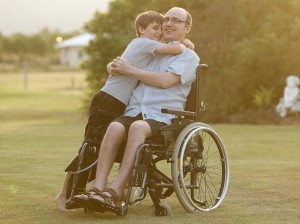
Gary Allen Multiple Sclerosis
PatientTalk.Org have just completed perhaps the most important interview in the blog’s history. Today we interview Mr Gary Allen. Gary has been a participant in some of the most encouraging research into multiple sclerosis for some years.
In the interview below Gary tells us about his multiple sclerosis and his role as a “guinea pig” in the research of Prof Michael Pender of the QIMR Berghofer Medical Research Institute. He tells how being part of the research has been significant improvements on his pain levels, feelings of fatigue and general cognition.
You can check out more about the research at http://msqld.org.au/homepage/latest-news/808-prof-pender-research-update
a) Please describe the story of your initial diagnosis and symptoms of MS?
I had what we now know was my first MS episode in 1994. I had terrible motion sickness and nausea, lost control of some of my facial muscles and had some reduced power in my legs. At the time there were a number of possible diagnoses, so when I recovered I got on with my life. It wasn’t until 2000 when I had another major episode that I was clinically diagnosed with relapsing remitting ms. In 2004 my MS went progressive.
b) How did the MS progress?
During the last 10 years my symptoms have… well, progressed. I slowly went from walking with a stick, to a crutch, to furniture walking and using a wheelchair for longer distances, to pretty much being in a wheelchair all the time, and then needing a hoist for transfers. I have no real touch or temperature sensation in my legs or arms. I also have intention tremors and lack of dexterity in my hands. My legs reached a point where they have very little voluntary movement but my involuntary reflex / spasms were ‘brisk’ (a term that doesn’t do it justice). The spasms can be painful and I had just started to experience the ‘lightning strike’ pain around my head before the treatment started. I also would get long periods of painful pins and needles in my hands and face. Looking back, I was really struggling with fatigue, concentration and cognition issues, which I didn’t notice because it crept up on me. All of which was impacting on my working life (I have continued to be very busy with two plus jobs… yes I am a self-confessed workaholic), time with my family and my social life.
c) Does the Queensland climate affect your MS?
Like many people living with MS, I have a certain degree of heat intolerance – so my symptoms become more pronounced as it gets hotter. Consequently Brisbane’s 68-82 degree F average in Summer and subtropical humidity can be a real challenge. At the age of 18 I moved from the grey and wet joys of England to Queensland, so you can imagine what a effortless transition in climate it was for me. <chuckle> Fortunately we have air conditioning at home so we can keep me reasonably cool.
d) Please can you introduce our readers to Prof Michael Pender’s treatment and research?
Back in 2004 (or thereabouts) Prof Pender theorised that the Epstein Barr virus (a common cause of glandular fever) was mutating the B cells of people with MS. As a consequence the virus was remaining in their systems – building up in the brain and spine. This was also responsible for the body attacking the brain and spine column causing the implication and damage associated with the progression of MS. More recently he’s been working with an oncology researcher at QIMR Berghofer Medical Research Institute. In 2013 Michael took 400ml of my blood, prompted it to develop ‘killer T Cells’ that eradicated EBV from my B cells. Because I was the ‘first human guinea pig’, they reinfused my cells over 4 visits in a 6 week period. Because I was first, we really had no idea of what to expect, but inside the first 2 weeks the results were astonishing.
e) How did you hear about it?
I donated some blood to Prof Pender’s research back in 2000. It turns out that I was an excellent candidate for the treatment (having lots of EBV infected cells and almost no EB antibodies). So in 2012 Michael visited me a couple of times to meet with me and my wife to discuss the treatment. It was something of a jump in the dark, with there not being any previous patients with MS receiving the treatment. The science looked excellent (I read research proposals for a living) but essentially it boiled down to: we think it will put a handbrake on the progression, but it might cause you to have a massive attack. Frankly 10 years into progression and no real treatment available, I had the attitude that it was well worth a punt. Looking back I am just so grateful for having had the opportunity, delighted we made the right decision, and very conscious of my responsibility to get the message out there that there is a light at the end of the tunnel for families struggling with progressive MS. I want to do what I can to help make a clinical trial a reality. The extra lumbar punctures and MRIs I’ve had to help collect data to make the case for a trial is the smallest of asks.
f) Can you describe the procedure to us?
It took around 4 weeks to ‘grow’ the killer T cells and do the lab testing. The cells were returned into my system via four infusions over a 6 week period. It was done this way so I could be closely monitored for adverse reactions / side effects. Following the treatment I returned to the ward several times for tests and neurological assessments. Next month I am due to have my (12 months on) lumbar puncture and MRI.
g) What were the outcomes negative and positive?
In less than 2 weeks we started seeing very positive outcomes. At first I was very conscious of the potential for the placebo effect, but the positives kept building, and have been sustained for a year. I have a remarkable change to my fatigue, cognition and memory. I have a significant improvement in pain levels (which is pretty much gone) and marked improvement in the size and duration of pins-and-needle discomfort. I saw a reduction in painful legs spasms and my intention tremor has in my left hand has reduced. I work as a policy officer at Griffith University and went from struggling through the delivery of three workshops a year to delivering one or two per week. I have a very nerdy indicator of the improvements: Prior to 2007 I could score up to 97 planes landed in the iPad game Flight Control. After 2007 I gave up playing because I couldn’t land more than 14. Two weeks after starting the treatment I got 117. In May last year I landed 561! At which point my wife gently observed that it might be time for a different challenge. 🙂 Last month my wife, son and I went on our first long holiday together in more than 10 years. I have the energy and enthusiasm to play with my boy. We’ve noticed some increase in voluntary movement in my legs – not much and we’re trying to work out now how much of that is because muscle shortening and atrophy. It was exciting when the scans and tests started to echo my lived experience. My MRI, (pre, during and post) went from showing four areas of my brain under attack to 2 and those 2 areas were 40% the size of what they were. The next scan results are going to be very interesting. I am yet to experience any side effect or negative outcome.
h) What do you think the future for the technique is?
MS Queensland is trying to raise AU$400,000 to conduct a clinical trial. That will provide more data about the effectiveness and safety of the treatment and is the first step in registering the testament with the Australian TGA. Ironically one of the of the things that attracted me to the treatment – the fact it involves no drug, no stem cells, just my own cells returned to me – also now is the funding challenge, there’s no drug for a pharmaceutical company to commercialise.
i) What is the prognosis of your multiple sclerosis?
Because I am the first guinea pig we have no idea how long this will last, whether it will need to be ‘topped up’ or what it means for my long-term prognosis. What I can say is that I have been blessed with an amazing year with no progression, some tangible improvements and perhaps the greatest gift of all: Hope.
j) Have you any advice for somebody just diagnosed with multiple sclerosis?
Oooo how much space do I have? <chuckle>. Perhaps 3 things:
- There really is reason to hope. An effective treatment is within reach.
- Keep up with your physio, stretches and working those muscles because you don’t want to be like me now wondering whether, if I’d practised what I’m preaching now, my legs maybe could be doing more.
- Always remember that accepting help, whether it’s in the form of pain management or other medication, counselling, a wheelchair or whatever isn’t giving up or admitting how bad things might go for you… it’s just help, and if it means you can cope better or can go out and about, it’s worth it!
k) What is, in your view, the future of Prof Pender’s research?
Michael believes that the theory and treatment works for early diagnosis relapsing remitting patients – i.e. at some point soon it will stop the damage before it happens. Now if that doesn’t take your breath away I don’t know what will.
To help raise money for a clinical trial my wonderful wife Renay is conducting a short story competition where the entry fee is donated to the Society. Go to http://www.renayallen.com/community-2/ to find out more and to enter the competition.




